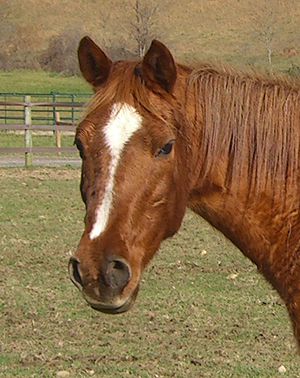 Two Socks, a 2007 clone of the 1980 stallion Jae Bar FletchThe civil court case set to decide whether cloned horses can or cannot be registered with the American Quarter Horse Association (AQHA) has a July 8 docket call in an Amarillo, Texas federal courtroom.
Two Socks, a 2007 clone of the 1980 stallion Jae Bar FletchThe civil court case set to decide whether cloned horses can or cannot be registered with the American Quarter Horse Association (AQHA) has a July 8 docket call in an Amarillo, Texas federal courtroom.
UPDATE: On July 8, an unrelated case was scheduled to be heard prior to the cloning lawsuit. According to attorneys involved in the case, the cloning case is now scheduled to start on July 16, a date that could be pushed back slightly depending on the court’s timeliness in wrapping up the preceding case.
The docket call could result in United States District Judge Mary Lou Robinson soon hearing the civil case filed in April 2012 by Texas horse owner Jason Abraham and veterinarian Gregg Veneklasen against the Amarillo-based AQHA. The judge also could just as easily select one of multiple pending criminal cases, a court clerk said. There is no way of knowing until July 8 which case will proceed.
If the civil case involving cloned Quarter Horses’ offspring is not chosen, it will remain on the docket and be reset for a future date in the same United States District Court for the Northern District of Texas, Amarillo division. It’s unlikely the case will reach an out-of-court settlement. A May 1 court-ordered mediation session produced a court report that simply stated, “Parties were unable to reach a settlement.”
Abraham and Veneklasen filed their antitrust lawsuit jointly in April 2012. It seeks to overturn AQHA Rule 227(a), which states: “Horses produced by any cloning process are not eligible for registration.” Cloning is defined as any method by which the genetic material of an unfertilized egg or any embryo is removed and replaced by genetic material taken from another organism, added to/with genetic material from another organism or otherwise modified by any means in order to produce a live foal.
The lawsuit alleges the AQHA rule illegally limits competition, putting owners of cloned horses and their offspring at an economic disadvantage. Since the AQHA does not register clones, it also does not allow for registration of the offspring of clones. The lawsuit filed against the horse association claims clones produce foals that are not clones, and are actually identical to any foals born following any other form of conception.
In its response to the lawsuit, AQHA attorneys stated as a private organization with voluntary memberships, the AQHA should be allowed to operate without interference from courts. The AQHA filed a motion to dismiss in May 2012, which was denied in late May 2013.
The National Cutting Horse Association (NCHA) has allowed clones to compete since 2009. So far, only three cloned horses are known to have competed as cutting horses, with only one of the three earning money. Two Socks, a 2007 clone of the 1980 stallion Jae Bar Fletch, owned and bred by Ernest Cannon, Stephenville, Texas, and trainer Boyd Rice, Spearman, Texas, has earned $1,375, according to NCHA records. Jae Bar Fletch (Doc’s Jack Sprat x Jae Bar Lena x Leo’s Question) earned $422,935 as a cutter.


